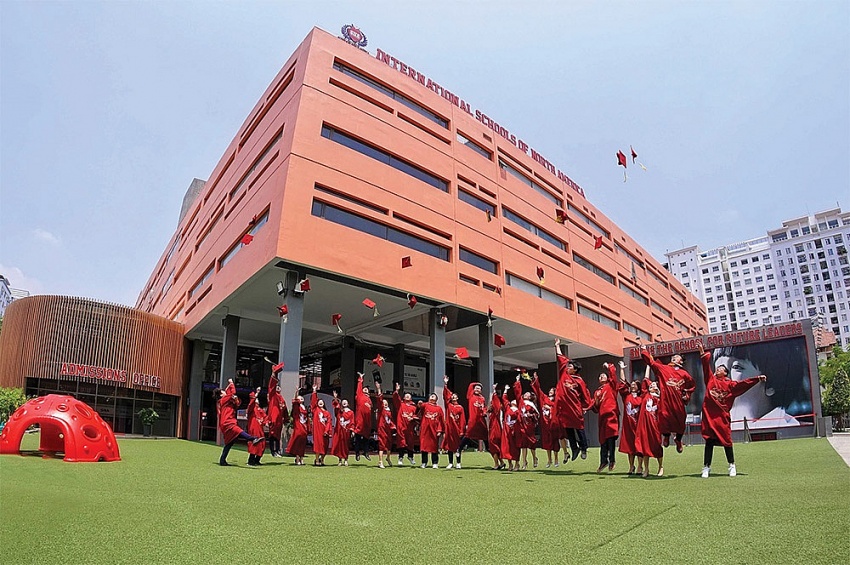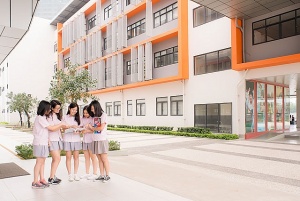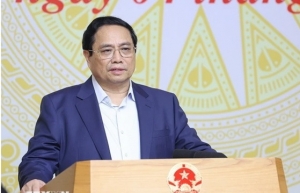Schools under fire for tuition pay practices
In late March, American International School of Vietnam (AISVN) in Ho Chi Minh City made headlines for the first time after it temporarily closed its doors due to teachers refusing to continue classes.
 |
| Some schools offer discounts of up to 50 per cent on tuition fees for advance payments Photo: Le Toan |
With both Vietnamese and expatriate teachers not being paid for a period of time, some parents stepped in to contribute massive amounts of money to AISVN in the form of loans or capital contributions.
The parents were originally given three options for their children’s education fees: investing roughly $170,000 for their children’s schooling from grade 1 to 12, with the amount refunded upon graduation or transfer; paying a non-refundable $90,000 for the entire period; or paying according to their children’s study progress.
Approximately 900 parents opted for the first package, noted Ho Chi Minh City Department of Education and Training, a sum amounting to $153 million.
Although they were promised their money back 90 days after graduation or transferring schools, many parents did not receive their contributions back, even after several years in some cases. The issue came to a head last month when more than 1,200 students were unable to learn when teachers refused to work until paid.
Ho Chi Minh City Public Security stated that the contract between AISVN and the parents was a civil contract without binding responsibilities among the parties, and say it is difficult for them to investigate.
Fraud allegations
In March, Egroup CEO Nguyen Ngoc Thuy was detained for “fraudulent appropriation of assets”. The decision was made after the Ministry of Public Security verified and resolved applications from many investors accusing Thuy of fraudulently appropriating assets through transferring shares of Egroup.
About 200 people had given money to Thuy as capital contribution to get interest, with the total amount sitting at nearly $10 million.
In early 2020, when Thuy announced plans to mobilise investment for Egroup with an attractive annual interest rate of 19-20 per cent, many people were quick to invest.
One investor, Tran Lan Phuong, deposited VND100 million ($4,170). “I made the decision very quickly because of the reputation and prestige of Thuy through the programme Shark Tank on television, as well as the attractive interest rate.”
Thousands of parents are said to have lost money when also paying tuition for their children to study at Apax Leaders, a subsidiary of Egroup, while dozens of foreign teachers have also complained online about missing wages for the past five years.
Tran Van Nghiem, a representative of parents collecting tuition debts from Apax Leaders, said, “Many people paid thousands or even tens of thousands of US dollars to send their children to study at Apax Leaders. With the tactic of ‘the more you pay, the higher incentives you enjoy,’ many parents borrowed and paid interest monthly.”
No parents have yet been paid back, and Apax Leaders still owe parents in Ho Chi Minh City nearly VND100 billion ($4.17 million).
Truong Hien Phuong, senior director at KIS Vietnam Securities Company, said that mobilising capital by education centres and schools was not necessarily a bad form of funding but a way to utilise the resources of parents and investors, as long as it complied with the law.
“However, when contributing capital, investors and parents should clarify the purpose of the capital flow, which categories the capital flow is allocated to, and where the revenue will come from,” Phuong said. “In particular, the cash flow must be a positive number, and the plan must be feasible and serious. These are some important factors before deciding to contribute capital.”
Funding initiatives
Besides AISVN, several international schools in Ho Chi Minh City are currently engaging in capital-raising initiatives from parents. For instance, the International School of North America offers discounts of up to half on tuition fees for advance payments ranging 2-12 years.
Similarly, the International School of South America provides a financial investment package wherein parents invest up to $90,000 to receive full tuition exemption, reimbursed upon programme completion.
In Hanoi, the Dewey School system implements multi-semester tuition payment programmes and no-interest tuition instalment plans, providing various benefits for parents paying fees in advance.
One distinctive aspect of school services is the practice of collecting fees upfront before providing the services, requiring learners to pay tuition in advance of studying. With long-term education investment packages, parents are often required to prepay tuition for several years in advance.
Dang Van Cuong, head of Chinh Phap Law Office and member of the Hanoi Bar Association, reiterates that current Vietnamese law does not explicitly prohibit or restrict schools from borrowing money from parents.
“Vietnamese law permits businesses to raise capital through various means, including loans from organisations, individuals, or credit institutions. Such borrowing is based on voluntary agreements, with funds earmarked for specific purposes and obligations outlined in the agreement between parties,” he said.
In the context of schools persuading parents to lend money in exchange for tuition incentives and promising infrastructure improvements, Cuong suggests that such cooperation can be mutually beneficial if the school has a solid financial plan in place.
However, he cautions that parents undertaking educational investment packages face risks, as lending relies on trust in the school’s leadership and future development with no guarantees. “Beyond the financial loss, the most tragic victims are the students, whose education has been interrupted,” Cuong said.
Phan Van Mai, Chairman of Ho Chi Minh City People’s Committee, emphasised the immediate priority of reintegrating AISVN’s students back into school. Following this, an interdisciplinary working group will collaborate with schools to formulate both short- and long-term operational and restructuring plans.
“Resolving disputes among stakeholders is imperative and should be addressed promptly,” he said. “For those opting to keep their children in the current school, plans must be devised to safeguard their educational rights.”
Additionally, the chairman tasked Ho Chi Minh City People’s Committee Office, and the Education and Training Department to reassess their responsibilities regarding the management of international schools and other private educational institutions, aiming to enhance regulatory oversight, aligning with both local laws and international standards, to uphold the welfare of students.
| Le Ba Thuong, Director Dan Tin Thanh Law Currently, the level of sanctions on capital mobilisation in the education sector is fragile compared to other fields such as securities and real estate. In the recent cases, many parents have filed petitions with the authorities, who then will provide penalties depending on the results of the investigation, if the centre or school is confirmed to abuse trust to appropriate property or fraudulently appropriated it. They may be convicted of abusing trust to appropriate property if the investigation agency determines that the centre or school uses money raised from parents for illegal purposes such as stock trading, and real estate without investing in the school’s development; or uses fraudulent tricks to appropriate assets by capital contribution contracts, among other aspects. If an investigation reveals that schools or centres used deceitful tricks to trick parents into signing property loan contracts for the purpose of appropriating property, they may be prosecuted for the crime of fraudulent appropriation of property. While waiting for the investigation agencies, parents should file a civil lawsuit with the court, where the school headquarters is located, to receive the loan amount, and request the court to freeze assets. If a school or centre goes bankrupt, the law will give priority to banks, taxes, employees, and then creditors. Among creditors, who has the earliest judgment will have priority to receive payment first based on the remaining assets of the school/centre. Vu Manh Hung, Education expert Hanoi University of Business and Technology The management of private schools should be separated between professional education and investment/capital contribution activities. The Law on Education does not include content on school management and investment, so current regulations on capital mobilisation or investment in private schools are still almost blank. We cannot find any provisions to answer the questions: Do these schools raise or call for capital or not? Must these activities comply with credit laws? Do they have obligations regarding information transparency and disclosure of business results? Is the bankruptcy resolution process of these schools the same as a normal business? All of these issues have already arisen in practice, so they need to be legislated to guide schools and parents (or investors) to clearly understand their rights, responsibilities, and limits. Moreover, we should differentiate support between non-profit and for-profit private schools. For non-profit ones, there must be a conflict of interest management mechanism as many countries have done, including mitigating the role of investors in governance or hindering profit sharing for school owners, distributing dividends to investors, and the board of management too much. In addition, the salary and income of school leaders must be made public. However, in general, policies should support non-profit schools and let for-profit schools operate under market mechanisms. |
 | Rising demand for private education in Vietnam Solid growth in expenditure for education indicates higher awareness and demand, especially for private education, foreign languages, entrance examinations, and extracurricular activities, according to an industry report released by FiinGroup on March 25. |
 | Preschool education a stepping stone for Vietnamese people’s development: PM Prime Minister Pham Minh Chinh on April 4 highlighted the important role of preschool education to the national education system as well as the country’s human resources development. |
What the stars mean:
★ Poor ★ ★ Promising ★★★ Good ★★★★ Very good ★★★★★ Exceptional
 Tag:
Tag:
Related Contents
Latest News
More News
- Vietnam sets ambitious dairy growth targets (February 24, 2026 | 18:00)
- Masan Consumer names new deputy CEO to drive foods and beverages growth (February 23, 2026 | 20:52)
- Myriad risks ahead, but ones Vietnam can confront (February 20, 2026 | 15:02)
- Vietnam making the leap into AI and semiconductors (February 20, 2026 | 09:37)
- Funding must be activated for semiconductor success (February 20, 2026 | 09:20)
- Resilience as new benchmark for smarter infrastructure (February 19, 2026 | 20:35)
- A golden time to shine within ASEAN (February 19, 2026 | 20:22)
- Vietnam’s pivotal year for advancing sustainability (February 19, 2026 | 08:44)
- Strengthening the core role of industry and trade (February 19, 2026 | 08:35)
- Future orientations for healthcare improvements (February 19, 2026 | 08:29)






















 Mobile Version
Mobile Version